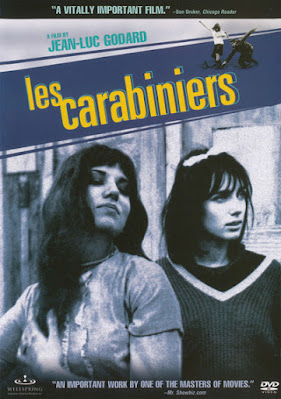Les Carabiniers’ spare, linear narrative was stunningly atypical of Godard, what with it’s having not just a beginning, a middle and an end, but also – ironically – in that order too. And his scathing anti-war satire – with sharp jabs also aimed at rampant commoditization in a capitalist, consumerist social structure – was also among his most brazen, acrid, anarchic and satiric; its droll mix of dreary realism and darkly funny absurdism, in fact, felt closer to the Czech New Wave. And these aspects made this such a radical departure in Godard’s filmography; no wonder, it was received with hostility upon release, and perhaps remains the least watched among his 15 Nouvelle Vague features. In the deadpan first act, two poor, gullible dolts – cigar-smoking Ulysses (Marino Mase) and leery Michelangelo (Albert Juross), married to glibly saucy and fashion-obsessed wives (Catherine Ribeiro and Geneviève Galéa) – are fooled by a couple of soldiers into going off to war, by telling them that the king himself has asked of this favour, and promising them of free-for-all riches – from permission to steal cars and slot-machines to committing pillage, rape and massacre. The discomfiting middle act portrayed the two dim-wits having a grand time amidst the devastating war raging across Europe; interestingly, their letters back home, chronicling the banality of violence, murders and mayhem, were composed of actual war-time correspondences; and, in a wry, self-reflexive moment, we see a hilariously failed attempt to break into the cinematic realm while watching a movie à la Keaton. And, in the farcical final act, they present their prized stash of war loots to their wives, viz. postcards on everything from Rin Tin Tin and the Pyramids to Cleopatra and Bardot.
Director: Jean-Luc Godard
Genre: Black Comedy/Political Satire/War
Language: French
Country: France


No comments:
Post a Comment